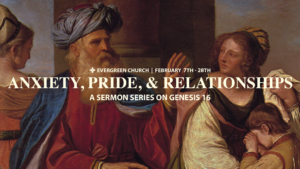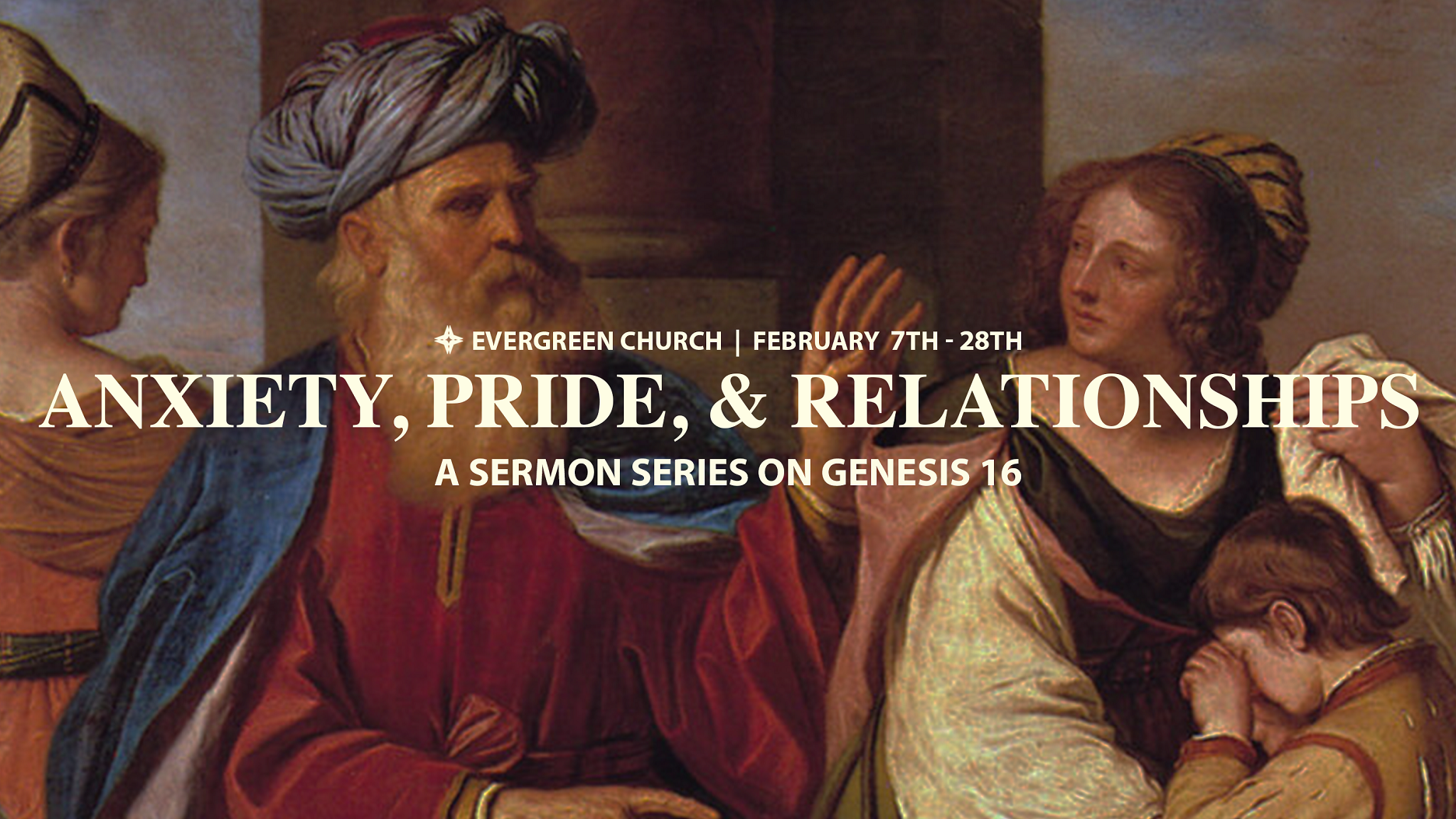
[Listen to an audio version here]
This passage is about two women struggling with significance. Do they matter at all? Sarah struggles with it because she has borne her husband no children. Hagar struggles with it because she is a slave. Today, I want to look at Hagar a little more closely. Through Hagar, we will see God’s solution to our struggle with insignificance and, by extension, the anxieties of life and our pride that tries to solve them on our own.
We have been considering how the Bible teaches that sin is a wrong response to our anxieties about life. We have anxiety over our prestige, position, and provision. We respond to this sinfully when we try to solve it on our own without reference to God. We try to make ourselves bigger or retreat into a smaller world where we can be in control. This is the pride solution. The result of wrongly calibrating our position in this world through pride is that it disrupts our relations with others and leads to injustice. How do we get out of this? Instead of trying to solve our problems on our own, we submit to God’s solution and trust Him.
The Bible teaches us the solution to sin, but it also teaches us about sin. It does this so that we can repent of our sin and turn from it to find grace, healing, and restoration in Christ. That healing is the primary focus of our message today.
Hagar Unseen
Hagar believed that she was not seen. She was invisible. She didn’t matter.
I remember visiting the Oak Alley Plantation in Louisiana. Anna, David, and I took a tour of the home. They described the situation. While the people ate dinner, a black slave would fan the diners so that they could be cool. If someone came and waved a fan by you, you would probably think it a little awkward. However, after a while, you would get used to it. Eventually, the person would be virtually invisible.
A slave is not “seen.” They rarely get the respect and honor of human beings. That’s no doubt how Hagar felt. She was not seen. She was invisible. She was just a cog in the household machinery.
Then, something changed. She was chosen by Sarah to bear a child for her master. She probably looked up to Abraham as a significant man and a leader. It seems like she would have been deeply moved to be chosen for this special role. Now, she would be seen.
Then, she got pregnant. Now, for sure, she must have thought, she will be seen! I am significant! She began to like this new role. She began to think that she was seen. In fact, this dramatic shift began to go to her head, and she started to look down on Sarah.
Well, Sarah did not like that very much. In fact, she was furious at the situation and relieved her anxiety first by taking it out on Abraham.
Think about things from this perspective. Hagar was now noticed. She was no longer invisible. She was seen by Abraham. Then, Sarah brought her complaint to Abraham. How did Abraham respond? “Your slave is in your hands,” Abram said. “Do with her whatever you think best” (Gen. 16:6). He only saw Sarah. He did not see Hagar. She was unseen again.
Sarah then mistreated Hagar. Then, Hagar fled into the wilderness.
Hagar Seen
However, someone did see Hagar. Someone noticed her and cared about her. The angel of the Lord found Hagar near a spring in the desert. . . . “And he said, ‘Hagar, slave of Sarai, where have you come from, and where are you going?'” (Gen. 16:7—8). Someone took an interest in Hagar and what she was doing. The “angel of the Lord” wanted to know about her. She was seen!
Let me say something here about “the angel of the Lord.” Sometimes in the Bible, an angel refers to a spiritual being that is intelligent and powerful that performs the work of the Lord. Some of these angels turned from the Lord and are often called “demons.” Angels and demons play an active part in the history of this world.
However, “the Angel of the Lord” is sometimes an appearance of God Himself, as it is in Gen. 18, for example. In Exodus 23, the Lord says, “See, I am sending an angel ahead of you to guard you along the way and to bring you to the place I have prepared. Pay attention to him and listen to what he says. Do not rebel against him; he will not forgive your rebellion, since my Name is in him” (vv. 20–21). This Angel of the Lord was none other than God Himself. He speaks of Himself as God, is worshipped as God, and is obeyed as God. I believe this is actually the 2nd Person of the Trinity, the Son of God, Jesus taking on a human or other form before His incarnation. We call this a Christophany, an appearance of Christ before the incarnation.
I believe the Angel of the Lord here is God Himself, though, even if it is an angel, I still think the passage works. I think it makes more sense, though, to see it as a Christophany.
At any rate, God saw this slave woman and took an interest in her. She responded, “I’m running away from my mistress Sarai” (Gen. 16:8).
God told her, “Go back to your mistress and submit to her” (Gen. 16:9). How can she do this when Sarah treated her so badly? The answer is that God would be with her and bless her. Her significance was not in what Sarah or Abraham thought of her but in what God thought of her. In addition, God had a big plan for her and the child in her womb, “I will increase your descendants so much that they will be too numerous to count” (Gen. 16:9).
Notice that the Lord was not unaware of the challenge of her predicament. He said, “You shall name him Ishmael, for the Lord has heard of your misery” (Gen. 16:11). Ishmael means “God hears.” Her challenges and difficulties were not unnoticed. God hears. God sees. God sees and hears Hagar.
Hagar was deeply moved by all of this. She finally knew that she was seen. She responded with a deep acknowledgement of this blessing. She “named” or “praised” the Lord: “You are the God who sees me.” “I have now seen the One who sees me” (Gen. 16:13). She knew she was significant. Others may not have seen her, but the Lord, her Creator, saw her and believed that she was significant.
After this, Hagar returned. How did she get the strength to show respect and honor even when it was hard? She saw the God who saw her. She found her significance in the fact that God valued her.
Conclusion
And that, my friends, is the way out of the disruption and dissolution of the pride solution. God shows up, and we see Him. That means more than mere intellectual awareness. We actually see Him, believe Him, and trust Him. We find the solution to the basic challenges of life in Him. That is the trust solution that overcomes the pride solution to anxiety. We trust God with our anxiety because above the problems we see the God who sees us.
When we see the problems of life that cause us so much anxiety but also see the Lord who is above them, we can experience a peace and joy that transcends those problems. This faith-filled vision of reality enables us to re-engage in our families, communities, and churches in a way that brings healing and restoration rather than disruption and dissolution.
Like Hagar, we can go back to our daily lives in confidence because we know the One who rules over all things and has all problems in His hand, and we know that He sees us and values us. I see the God who sees me. Amen.

 Where does injustice come from? Humans can treat each other with astonishing cruelty, far outstripping even the most vicious animals. How does it come about that humans behave so unjustly?
Where does injustice come from? Humans can treat each other with astonishing cruelty, far outstripping even the most vicious animals. How does it come about that humans behave so unjustly? Life is full of problems that we can’t solve. What will people do? Will they abandon us? Will they try to control us? Will they move on and leave us behind, alone?
Life is full of problems that we can’t solve. What will people do? Will they abandon us? Will they try to control us? Will they move on and leave us behind, alone?